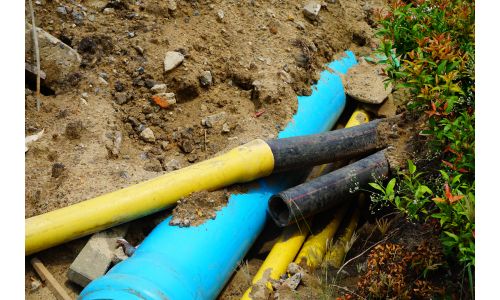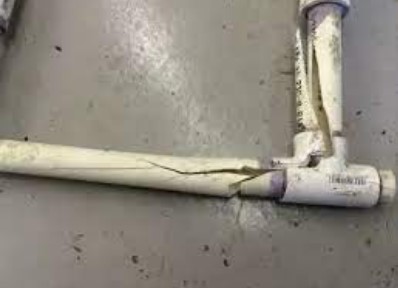Due to low heat conductivity, PVC pipes are a great choice for your home plumbing systems. They also last a fairly long time to keep you relaxed. But problems occur when it is chilled outside. Sub-zero temperatures will affect PVC pipes.
So, will PVC pipe freeze underground? Yes, PVC pipes can freeze underground if the temperature is below 20℉. However, if the pipe is properly insulated, the risk of freezing drops dramatically. And if the pipes are frozen for too long, it increases the risk of rupture.
Let’s know more about how PVC pipes freeze underground and what you can do to prevent PVC pipes from freezing.
Will PVC Pipe Freeze Underground?
Yes. Although it’s the copper pipes that are at the highest risk for freezing, PVC is also susceptible to freezing. Besides, exterior PVC pipes are more likely to freeze than underground ones.
However, PVC pipes can withstand more harsh temperatures even though the freezing condition starts below 32℉. But they will also start freezing when it is 20℉. Likewise, depending on the depth of the pipes, it can take eight or more hours for PVC pipes to freeze completely.
What Happens If PVC Pipes Freeze Underground?
If the PVC piping in the underground starts freezing, you will start to notice a drop in the water supply.
- Freezing will cause blockages inside the pipe and less water will come out of the faucet or fixtures.
- Also, the water temperature will drop due to the freezing conditions.
- When the pipes are completely frozen, you might get no water supply from the system.
- As you might already know, water increases its volume when it turns into ice. If the PVC pipe freezes, the water inside will also freeze. At one point, the ice will put pressure on the PVC pipes. And this excess pressure will result in cracks or bursts.
If the PVC pipe bursts underground, it can be a difficult problem to solve. So, it is always better to consider strategies before installing PVC pipes underground.

What Signs Tell You That PVC Pipe Is Frozen Underground?
You could tell if the PVC pipe underground is frozen by the following signs. Check them out.
- Water Supply Becomes Limited
You will notice a drop in the water supply. Instead of water coming out of the faucets or other fixtures at full pressure, it will start to dribble. This is when you know the PVC pipes are freezing.
- Weird Sounds from the Faucet
When water freezes inside PVC pipes, the water flow becomes unusual. This movement can cause weird sounds to come from your faucets. For example, you might hear sounds like the pipe is gurgling. Sudden banging is also a sign of freezing PVC pipes.
- Bulges in the Pipe
If you use metal faucets, they might not have any noticeable change when the PVC pipes freeze. But if you check the underground piping, you will notice bulges in the pipe. These are caused by the increased pressure of the frozen water.
- Cracks or Bursts
When the pipes can’t withstand the pressure anymore, you will see cracks in the pipes at the final stage of the process. In some cases, extreme pressure can cause PVC pipes to burst.
How to Unfreeze PVC Pipe Underground?
If PVC pipes freeze underground, you need to take the following steps to thaw the pipe.
Step 1: Keep the Water Running
There can still be some water inside freezing PVC pipes. You need to keep faucets and other fixtures open so that the water can drip out. This will release some pressure from the pipes and keep them from bursting.
Step 2: Gently Heat the Pipes
- You will need a hot air blower to thaw frozen PVC pipes. Remember, using propane torches or other direct heating elements can damage the pipe badly.
- Take a hairdryer and gently apply heat to the pipe. Start from the faucet so that the opening remains clear when the pipe thaws.
- Gradually move to the underground piping area and continue heating the pipe until you see the bulges go away.
- Keep the faucets open so that all icy water can get out of the system.
It will take about 30 minutes to one hour to unfreeze the pipe completely.
How to Prevent PVC Pipe from Freezing Underground?
Careful installation and use can prevent PVC pipes underground from freezing. Follow these tips.
- While installing PVC pipes underground, insulate them with a good thermal insulator. Foam is an inexpensive option to insulate PVC pipes underground.
- If you are going out for a long time, keep the heating turned on at a low setting. Make sure the thermostat is set to higher than 32℉ so that the pipes don’t freeze.
- Use a bib shut-off valve to remove water from pipes during freezing weather conditions. Close the valve and turn on the outdoor faucet for some time. No water will remain inside the pipe and the pipe won’t freeze.
Frequently Asked Questions
Check answers to some commonly asked questions about PVC pipes freezing underground.
Q: Is PVC a good thermal insulator?
A: Yes, PVC is a good thermal insulator. Yet, water inside PVC pipes can freeze at very low temperatures. But it takes longer to freeze than other pipes, such as copper.
Q: How deep does it need to bury PVC pipes to avoid freezing?
A: According to the International Plumbing Code, PVC pipes should be buried 6-12 inches deep underground. Installing pipes higher can make them more prone to freezing. And if you go deeper, pipes will face excess pressure.
Q: Will PVC pipes freeze inside concrete slabs?
A: If the temperature drops too much, PVC pipes inside concrete slabs can also freeze.
Final Thoughts
Freezing is a common problem for exterior pipes. But will PVC pipe freeze underground? Yes, if the temperature is too low and the pipes aren’t properly insulated.
Frozen PVC pipes will reduce the water supply and cut it off gradually. The rise in pressure inside the pipes will cause them to crack or burst. So, it is best to take preventive measures while installing PVC pipes underground. Using thermal insulation is effective in keeping pipes from freezing.

